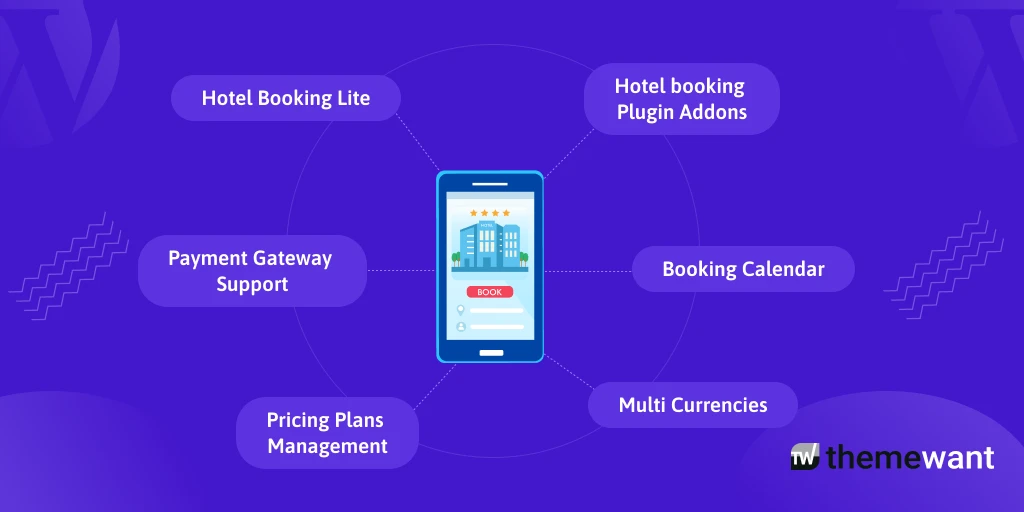Running a hotel website without the right booking features can frustrate guests and lead to missed reservations. Many travelers abandon sites that lack clarity, flexible payments, or real-time availability, which means lost revenue for your business. The problem isn’t just competition, it is the user experience your website delivers.
The solution lies in equipping your WordPress site with powerful hotel booking features designed to simplify reservations and build trust. With the right tools, you can provide guests with a smooth, professional, and secure booking journey that keeps them coming back.
In this article, we’ll highlight the top hotel booking features for WordPress that every hotelier should consider. By implementing these essentials, you can enhance guest satisfaction, streamline operations, and maximize your online bookings with ease.
Top Hotel Booking Features for WordPress
Building a hotel booking website with WordPress requires the right features to create a seamless guest experience and streamline hotel operations. From managing reservations to handling payments, the right setup ensures both guests and hoteliers benefit.
Online booking system
An online booking system is the foundation of a hotel website built on WordPress. It allows guests to browse available rooms, check details, and make reservations instantly without the need for back-and-forth communication. This feature reduces manual workload for hotel staff and makes the booking journey seamless for customers. A strong system should also integrate with calendars and availability rules to ensure real-time accuracy.
Beyond basic reservations, a powerful booking system can handle multiple booking types, whether that is free reservations, prepaid stays, or partial deposits. It should also support different booking scenarios like group bookings or last-minute reservations. By automating the entire process, it improves operational efficiency and enhances guest satisfaction, ensuring a smooth and trustworthy user experience.
Real time availability calendar
A real time availability calendar prevents double bookings by showing which rooms are available for specific dates. Guests can see instantly whether their preferred room is free, reducing the chances of disappointment. This transparency builds trust and encourages more users to complete their reservations directly on the website rather than seeking third party platforms.
For hoteliers, having an automatically updated calendar saves time and eliminates human error. Instead of manually managing bookings, the system syncs and updates availability across all listings. This means the hotel can offer a professional, reliable service while reducing the risk of oversights, which can otherwise damage reputation and lead to customer dissatisfaction.
Multiple payment gateways
Supporting multiple payment gateways gives guests flexibility and ensures that bookings can be confirmed from anywhere in the world. Payment options like PayPal, Stripe, Authorize.net, or WooCommerce Payments make the transaction process secure and reliable. This convenience increases the likelihood of successful reservations, as customers are more comfortable paying through their preferred method.
From a hotel’s perspective, offering diverse payment options is not just about guest convenience, it is also about revenue assurance. Advanced booking systems can process partial payments, deposits, or full prepayments depending on the hotel’s policies. This minimizes last minute cancellations and secures cash flow, making it easier to manage business operations.
Room and rate management
Effective room and rate management allows hotels to list unlimited rooms with detailed descriptions, photos, and amenities. Guests can filter rooms by category, such as single, double, deluxe, or suite, and instantly compare features and pricing. This flexibility makes the booking process more personalized, increasing the likelihood of conversions.
In addition to basic categorization, advanced systems enable hoteliers to create dynamic pricing models. Hotels can define rates based on occupancy, demand, or type of guest. For example, a business traveler booking during the week might see different rates compared to a tourist visiting on a weekend. This level of customization maximizes revenue potential while still meeting guest expectations.
Seasonal pricing and discounts
Seasonal pricing allows hotels to adjust rates based on demand, holidays, or special events. For instance, rates may increase during peak summer or festive periods and drop during off seasons to attract more visitors. This ensures that hotels remain competitive while optimizing revenue according to market trends.
Discounts and promotional codes can also be integrated to reward loyal customers or encourage longer stays. Features like early bird specials, last minute deals, or extended stay discounts give hotels more control over their marketing strategies. These options not only drive higher occupancy rates but also help in building long term guest relationships.
Custom booking rules
Custom booking rules ensure that a hotel’s policies are automatically enforced during the reservation process. Hotels can set rules for check in and check out times, minimum or maximum nights per booking, and restrictions during high demand periods. This prevents misunderstandings and aligns bookings with operational realities.
Beyond basic rules, advanced systems allow for non refundable reservations, mandatory deposits, and special conditions for group bookings. By setting these policies upfront, hotels reduce the risk of cancellations and ensure smooth scheduling. It also saves staff time since guests are informed of the policies before completing a booking.
Integration with OTAs
Integration with OTAs like Booking.com, Airbnb, and Expedia is crucial for hotels looking to expand their visibility. By syncing availability via iCal or API connections, hotels can ensure that bookings are automatically updated across platforms. This eliminates the risk of double booking and helps the property maintain a professional reputation.
For hotel owners, this integration is a revenue booster. Instead of managing each OTA separately, the WordPress system centralizes all bookings in one dashboard. This makes it easier to track performance, manage guest inquiries, and ensure that every booking channel works in harmony without creating extra administrative burden.
Multi language and multi currency support
Multi language support allows hotels to serve international guests effectively. A booking system integrated with WPML, Polylang, or Loco Translate ensures that guests can browse the site in their preferred language. This feature makes the website more accessible and user friendly, encouraging higher booking rates from global travelers.
Similarly, multi currency support simplifies the booking process by allowing payments in different currencies. Instead of making guests calculate conversions, the system automatically displays room prices in their local currency. This creates trust and reduces friction during checkout, leading to higher conversion rates for hotels targeting international audiences.
Guest management dashboard
A guest management dashboard empowers visitors to handle their reservations easily. Guests can log in, view upcoming bookings, cancel or reschedule stays, and update personal information. This self service option improves user satisfaction and reduces the workload for hotel staff, who otherwise would need to manage these tasks manually.
On the admin side, dashboards provide valuable insights into guest history, payment records, and booking trends. Hotel staff can track frequent visitors, identify loyal customers, and personalize services accordingly. This feature is not just operationally efficient, it also creates opportunities for upselling and targeted marketing.
Email and SMS notifications
Automated notifications ensure that guests are always informed about their reservations. From booking confirmations and reminders to cancellation alerts, these communications build confidence and reduce no shows. A well timed reminder can also help guests prepare for their stay, improving the overall experience.
For hotels, notifications streamline communication and reduce errors caused by manual follow ups. Staff no longer need to send emails individually, as the system takes care of it automatically. This not only saves time but also ensures consistent communication, reinforcing professionalism and reliability.
Extras and services booking
Hotels often rely on upselling additional services like breakfast, spa treatments, guided tours, or airport transfers. A WordPress booking system that supports add ons during checkout can significantly increase average revenue per guest. Guests appreciate the convenience of customizing their stay in one smooth booking process.
From the hotel’s perspective, this feature transforms the website into more than just a booking portal, it becomes a complete travel experience platform. By offering personalized services, hotels can differentiate themselves from competitors, boost revenue, and create memorable guest experiences that encourage repeat visits.
Mobile responsiveness
With most travelers booking from their smartphones, a mobile responsive system is non negotiable. A booking site must load quickly, display rooms clearly, and process reservations smoothly on any screen size. If the mobile experience is poor, hotels risk losing a significant number of potential bookings.
Responsive design also builds credibility and ensures accessibility. Guests who can book effortlessly on the go are more likely to complete reservations and return in the future. For hotels, investing in mobile optimization is directly tied to higher conversions and improved guest satisfaction.
Reporting and analytics
Reporting and analytics give hotels the ability to track booking trends, revenue performance, and occupancy rates. With clear insights, hoteliers can make data driven decisions, such as adjusting prices during low demand periods or offering targeted promotions to boost sales.
Detailed reports also help identify guest demographics and behavior patterns. For example, if analytics show a surge in weekend bookings from families, hotels can introduce family friendly packages. This data driven approach ensures hotels remain competitive and profitable in an evolving marketplace.
Secure guest data management
Security is a top priority when handling sensitive guest data. A strong WordPress booking system ensures GDPR compliance, SSL encryption, and secure payment processing. This protects customers from data breaches and builds confidence in the hotel’s ability to safeguard their information.
For hotels, secure data management is not only about compliance but also about reputation. Any breach can severely damage trust and result in legal consequences. A secure booking system ensures smooth operations while providing peace of mind for both guests and hotel owners.
Final Thoughts
A well-chosen hotel booking solution for WordPress can completely transform how guests interact with your website and how smoothly you manage reservations. By focusing on essential features like real-time availability, flexible payment options, and user-friendly booking forms, you create a seamless experience that builds trust and encourages direct bookings.
At the same time, tools like automated confirmations, integrations with popular platforms, and mobile responsiveness ensure that managing operations remains efficient on your end. Investing in these features not only enhances guest satisfaction but also positions your hotel website as professional, reliable, and future-ready.














